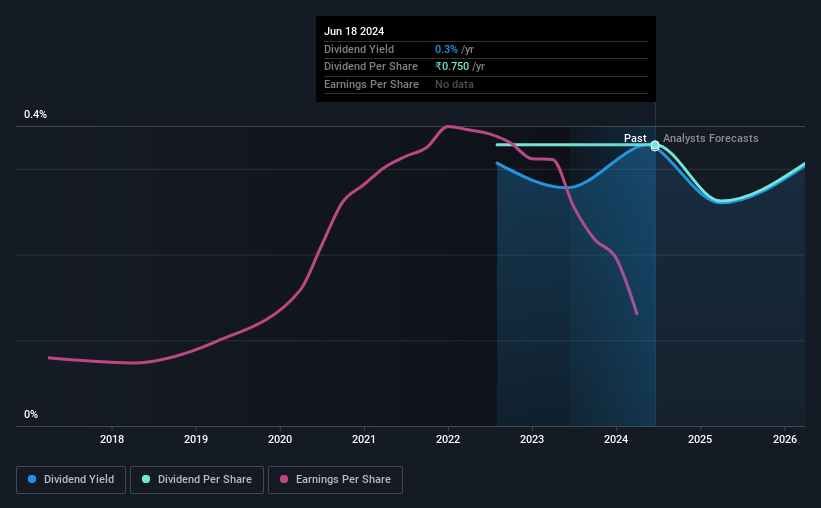
India Pesticides Limited's (NSE:IPL) investors are due to receive a payment of ₹0.75 per share on 19th of September. This means the annual payment will be 0.3% of the current stock price, which is lower than the industry average.
Check out our latest analysis for India Pesticides
India Pesticides' Earnings Easily Cover The Distributions
While yield is important, another factor to consider about a company's dividend is whether the current payout levels are feasible. Before making this announcement, India Pesticides was easily earning enough to cover the dividend. This means that most of its earnings are being retained to grow the business.
The next year is set to see EPS grow by 180.0%. If the dividend continues along recent trends, we estimate the payout ratio will be 1.0%, which is in the range that makes us comfortable with the sustainability of the dividend.

India Pesticides Doesn't Have A Long Payment History
The company has maintained a consistent dividend for a few years now, but we would like to see a longer track record before relying on it. There hasn't been much of a change in the dividend over the last 2 years. Modest dividend growth is good to see, especially with the payments being relatively stable. However, the payment history is relatively short and we wouldn't want to rely on this dividend too much.
We Could See India Pesticides' Dividend Growing
The company's investors will be pleased to have been receiving dividend income for some time. India Pesticides has impressed us by growing EPS at 5.8% per year over the past five years. With a decent amount of growth and a low payout ratio, we think this bodes well for India Pesticides' prospects of growing its dividend payments in the future.
Our Thoughts On India Pesticides' Dividend
Overall, we think India Pesticides is a solid choice as a dividend stock, even though the dividend wasn't raised this year. The dividend has been at reasonable levels historically, but that hasn't translated into a consistent payment. Taking all of this into consideration, the dividend looks viable moving forward, but investors should be mindful that the company has pushed the boundaries of sustainability in the past and may do so again.
Companies possessing a stable dividend policy will likely enjoy greater investor interest than those suffering from a more inconsistent approach. However, there are other things to consider for investors when analysing stock performance. For instance, we've picked out 3 warning signs for India Pesticides that investors should take into consideration. Is India Pesticides not quite the opportunity you were looking for? Why not check out our selection of top dividend stocks.
New: AI Stock Screener & Alerts
Our new AI Stock Screener scans the market every day to uncover opportunities.
• Dividend Powerhouses (3%+ Yield)
• Undervalued Small Caps with Insider Buying
• High growth Tech and AI Companies
Or build your own from over 50 metrics.
Have feedback on this article? Concerned about the content? Get in touch with us directly. Alternatively, email editorial-team (at) simplywallst.com.
This article by Simply Wall St is general in nature. We provide commentary based on historical data and analyst forecasts only using an unbiased methodology and our articles are not intended to be financial advice. It does not constitute a recommendation to buy or sell any stock, and does not take account of your objectives, or your financial situation. We aim to bring you long-term focused analysis driven by fundamental data. Note that our analysis may not factor in the latest price-sensitive company announcements or qualitative material. Simply Wall St has no position in any stocks mentioned.
Have feedback on this article? Concerned about the content? Get in touch with us directly. Alternatively, email editorial-team@simplywallst.com
About NSEI:IPL
Flawless balance sheet second-rate dividend payer.
Similar Companies
Market Insights
Community Narratives



